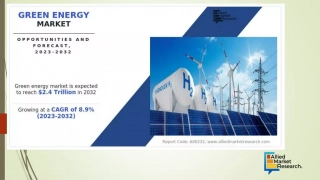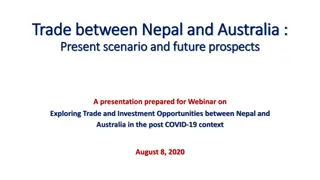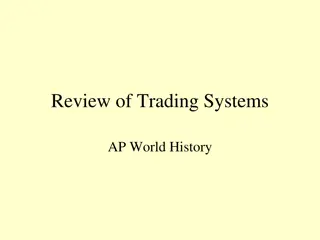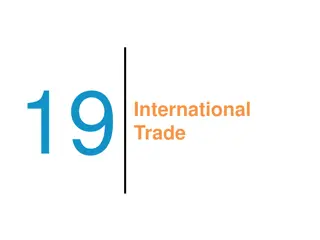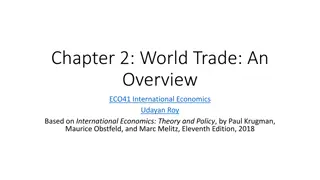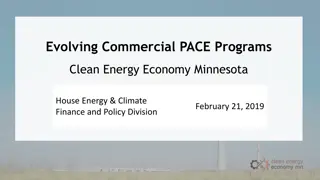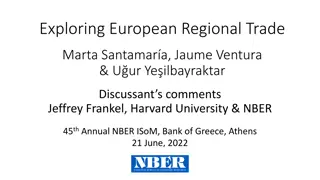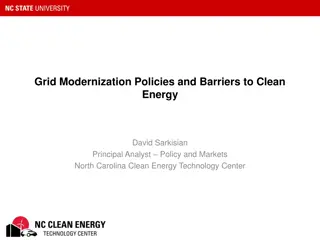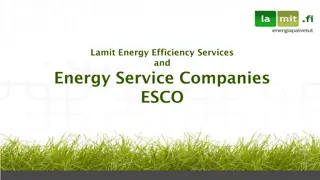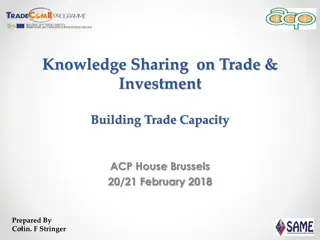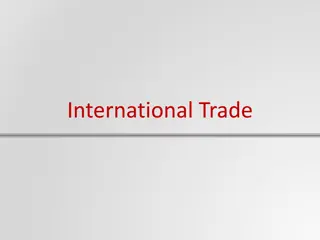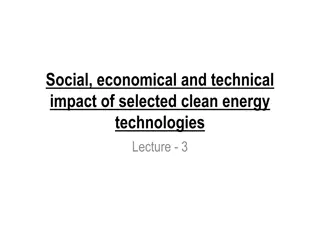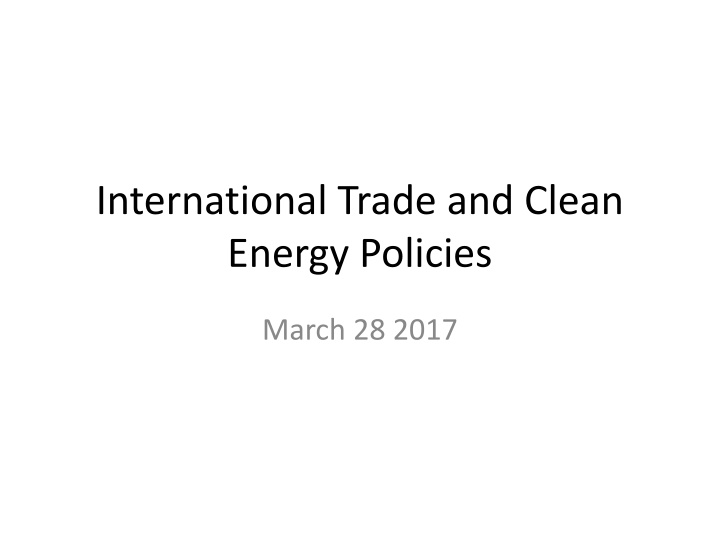
Global Trade Impact on Clean Energy Policies and Decarbonization Challenges
Explore the intricate relationship between international trade, clean energy policies, and decarbonization challenges, discussing global governance, trade disputes, and the political economy of renewable energy amidst the push for low-carbon economies.
Download Presentation

Please find below an Image/Link to download the presentation.
The content on the website is provided AS IS for your information and personal use only. It may not be sold, licensed, or shared on other websites without obtaining consent from the author. If you encounter any issues during the download, it is possible that the publisher has removed the file from their server.
You are allowed to download the files provided on this website for personal or commercial use, subject to the condition that they are used lawfully. All files are the property of their respective owners.
The content on the website is provided AS IS for your information and personal use only. It may not be sold, licensed, or shared on other websites without obtaining consent from the author.
E N D
Presentation Transcript
International Trade and Clean Energy Policies March 28 2017
outline Globalization and decarbonization The challenge: political economy of renewable energy Overview of free trade rules Trade disputes on clean energy Race to the bottom Policies to protect leaders Reform options
Impacts of globalization on decarbonization policies Global governance (UNFCCC) can push decarbonization Global competition risks race to the bottom International trade agreements constrain domestic policy choice
https://www.adb.org/sites/default/files/publication/230591/adbi-wp675.pdfhttps://www.adb.org/sites/default/files/publication/230591/adbi-wp675.pdf
Lewis I argue that there is a fundamental conflict between the political economy of domestic renewable energy support and the basic principles of global trade regimes, with direct implications for nations abilities to transition to low carbon economies. For governments to garner political support for renewable energy technologies, they must promise job creation and domestic technological progress, both of which compel direct interventions with international trade flows and may conflict with multiple WTO provisions and domestic trade laws.
Hobergs version: Why climate action is so hard politically Cost of Mitigation Benefits of Mitigation Here Global Now Distant in Time Relatively certain Highly uncertain The Tragedy of the Atmospheric Commons 6
Political Economy of Renewable Energy Governments have a hard time justifying costly* policies to reduce GHG local costs for global benefits Tying climate policies more directly to domestic economic activity, jobs, technology leadership reduces this challenge
Trade rules - origins 1948 General Agreement on Tariffs and Trade (GATT) World Trade Organization (WTO) established in 1995 Subsumed GATT Trade -related Investment Measures (TRIMS) Subsidies and Countermeasures Dispute Settlement
Trade rules Basic principle: non-discrimination between domestic and foreign WTO/GATT Article III (sec 4) states: The products of the territory of any contracting party imported into the territory of any other contracting party shall be accorded treatment no less favorable than that accorded to like products of national origin in respect to all laws, regulations and requirements affecting their internal sale, offering for sale, purchase, transportation, distribution, or use. Also know as national treatment : equal treatment of imported and locally produced goods
Article XX exemptions George Hoberg, Trade, Harmonization, and Domestic Autonomy in Environmental Policy, Journal of Comparative Policy Analysis 3: 191 217, 2001
Trade disputes - subsidies US-China over subsidies to solar PV manufacturers EU-China over subsidies to solar PV manufacturers Resolved with managed trade agreement: import quote plus floor price US-China over wind subsidies India-China over wind subsidies
Trade disputes local content measures Japan et al v Ontario over feed-in tariff US-China wind (settled with China withdrawal) China et al v EU on FIT US v India on wind local content
India Solar Cells https://www.wto.org/english/tratop_e/dispu_e/cases_e/ds456_e.htm National Solar Mission (provisions) Generate 100 GW of grid-connected solar by 2022 Graduated requirement that PVs had to manufactured in India India argued measures justified under Article XX(d) - they secure India's compliance with laws or regulations requiring it to take steps to promote sustainable development but WTO panel rejected argument Appellate Body upheld Panel conclusions appealed by India
Canada Renewable Energy / Feed-In Tariff Program EU, Japan (other countries) challenged the domestic content requirement of the FIT rules 2012 Panel ruled that DCRs violated rules Canada, others appealed Appellate Body agreed with Panel June 2014 Ontario informed WTO it would comply
Debate: should local content requirements be permissible for policies that promote decarbonization?
Race to the bottom - concept Product standards: industry has an interest in harmonization Process standards: firms may suffer a competitive disadvantage if the costs of complying with regulations exceed those of their competitors
Race to the bottom - evidence Surprisingly little evidence Regulatory costs usually relatively minor component of costs of production But the higher the percentage and the more mobile the industry, the bigger the concern Countervailing trend: California effect
Protecting climate policy from competitiveness effects
Protecting climate policy from competitiveness effects
Policies to protect leaders (Trachtman) Issues are both race to bottom and leakage Options: Border tax adjustment on imports Border tax adjustment credit for exports Tax credit mechanisms
Reform options (Lewis) Revise WTO rules to create specific exemptions Revise UNFCCC rules to clarify that it s goals shouldn t be undermined by WTO rules Create a Sustainable Energy Trade Agreement
Conclusions Fragmented international regimes frustrates decarbonization objectives Aggravates atmospheric tragedy of the commons Prospects for rule changes seem dim Next week: reasons for hope

